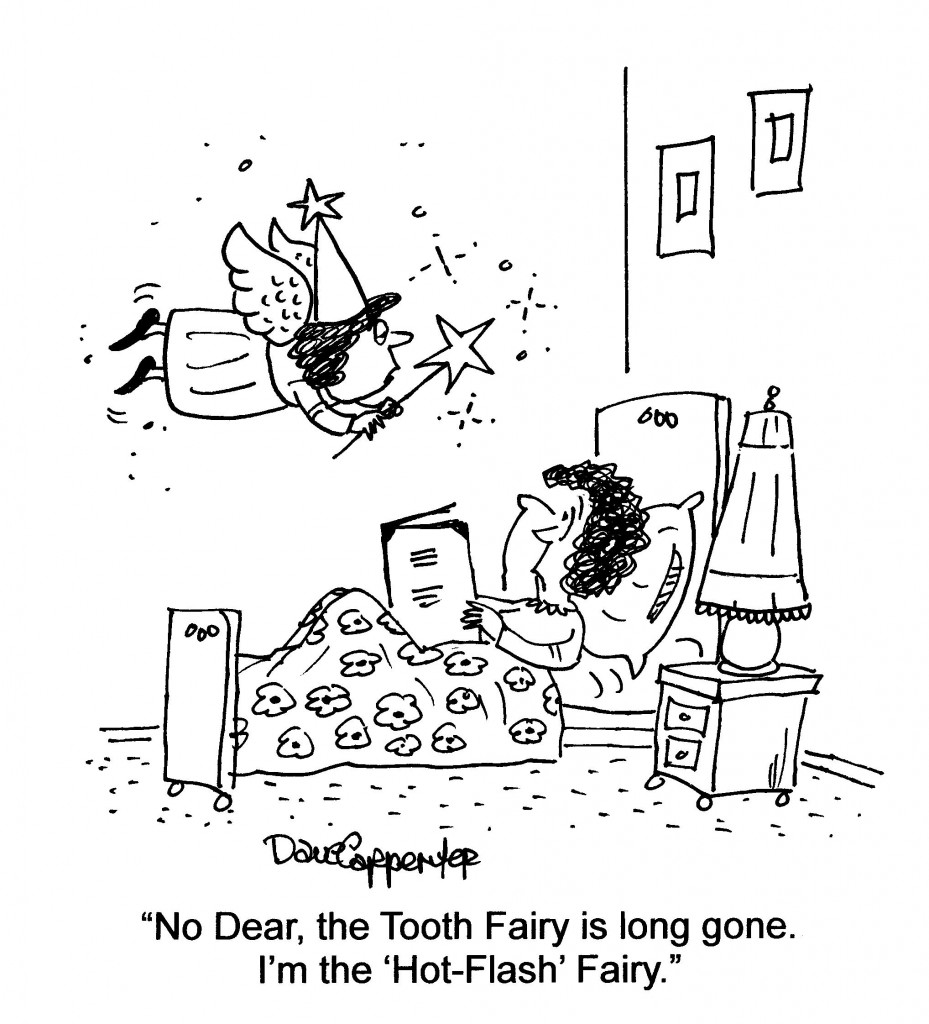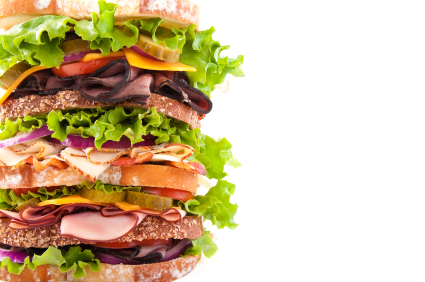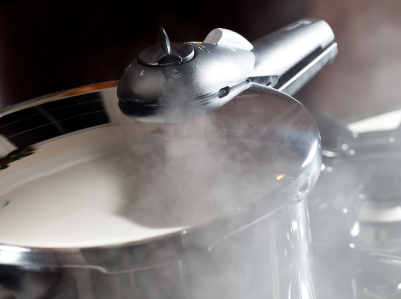Friday Folly: Long in the tooth…
I was amused to read a post the other day on Facebook about a friend’s child awaiting the Tooth Fairy. And then it hit me: tooth fairy? I’m so long in the tooth that those days are long gone. Now? It’s the Hot Flash Fairy!
Hope you’ll get a few giggles; I did!
Read MoreThe path to healthy aging is paved with a healthy diet
Ladies, listen up! Have you heard the adage ‘a ripe old age?’ Well, researchers involved in the ongoing Nurses Health Study are reporting that an important key to healthy aging is diet. However, it’s not just any diet so before you convince yourselves that you’ve won the golden ticket, let me share that the focus is on modified Mediterranean, i.e. a diet rich in plant foods, whole grains, fish or omega-3 polyunsaturated fatty acids, a moderate intake of alcohol and a lower intake of red and processed meats.
For decades, experts have been sharing that people that follow a strict Mediterranean diet die less often from heart disease and cancer, have lower rates of stroke, cognitive impairment and depression and overall possess improved physical well-being and functioning. However, questions have remained with regard both to timing and also the exact dietary patterns.
Fortunately, a thorough review of dietary reports provided over a 15 year period by 10,670 women in their 50s and 60s shows that commitment to healthy eating in midlife provides women with a 40% greater likelihood of healthy aging.
So, what does ‘healthy aging’ mean exactly?
The researchers report that for the most part, and compared to ‘usual agers,’ healthy agers were free from chronic disease, were less likely to be obese and tended to suffer less from high blood pressure and high cholesterol. They also had fewer cognitive, physical or mental health issues or limitations. Most importantly, the benefits relied upon the ‘best of both worlds dietary habits,” i.e. a combination of an ‘alternative healthy eating index,’ (i.e. greater intake of veggies, less potatoes, fruits (excluding juice), whole grains, nuts, legumes, polyunsaturated fats and a lower intake of red or processed meats, juices, sugar, trans fats and sodium) and a traditional Mediterranean diet (i.e. veggies (excluding potatoes), fruits, nuts, whole grains, legumes, fish and monounsaturated fats, and a lower intake of red or processed meats and alcohol), which was found to boost health years later.
In addition to diet, another important takeaway from this information is the importance of the midlife time point: starting out on a healthy course in midlife predicted the likelihood of healthy aging, good health and overall well-being. The conclusion? No time like the present to make important dietary changes.
Read More
Wednesday Bubble: Menopause Skin Cream Redux
 Did you catch Monday’s post about Stratum C and the promise of this unique cream and serum on menopause skin? A few hours after the post went live, I received an email from one of the company’s representatives who explained that the products were not only backed by published data but were priced accordingly:
Did you catch Monday’s post about Stratum C and the promise of this unique cream and serum on menopause skin? A few hours after the post went live, I received an email from one of the company’s representatives who explained that the products were not only backed by published data but were priced accordingly:
“The combination of peptides in the products is unique and includes the optimum strength needed to counteract the effects of menopause. Both products also contain high levels of hyaluronic acid and low aqua content (approximately 40% in the cream and 18% in the serum, which in comparison to most high street products is a lot less than the usual 90% aqua content). The price reflects how we have used high levels and only the highest quality ingredients.”
While I stand by my initial comments with regard to the low number of women on which the products have been tested, I am always willing to be challenged on my assumptions. Consequently, I’ve agreed to try Stratum C and see how it goes. I don’t anticipate that the environmental toll that my facial skin has taken will be reversed but hey, you never know, right?
Stay tuned. This story is only just beginning.
Read MorePondering the weighty subject of… weight.

Guyside columnist Bob LeDrew will never be mistaken for this person.
I know I don’t. But I do see a certain uptick in that “time spent thinking about diet” graph in recent years.
As an adolescent, I was blessed with a metabolism that burned everything I could shovel into my mouth and then some. And even through most of my adult life, I really haven’t thought about diet beyond “when is the next meal?”
But as I edge toward 50, I have started to make some changes. Why? First, I have seen that little band of blubber around my waist grow from a finger-width to what is probably 15-20 pounds of weight I don’t really need. Second, my encounter with bladder cancer in 2006 led to some increased concern about health in general. Third, it was always so simple when you could go out for beer and wings at will and never show any effect (my personal best: 80 wings with an unwise quantity of beer to wash ‘em down in an evening), but when you start to feel the hangover from booze as well as post-gluttonous digestive effects, it makes you think.
At least when it comes to body image, I think men and women are working from two separate objectives. It’s my belief that generally, women are more affected by pop-culture images of women than men. I don’t look at Hugh Jackman and think “I’m grotesque.” I think men are more tied to the body image of their younger selves, and that it takes some sort of breakthrough for a man to realize that his body isn’t the same at 47 as it was at 17, or 27.
And of course, it’s clear that we men have some real issues around body image — and body reality. Even if you think you’re fine, men in the United States have a real-life obesity problem. Check this out.

These guys show the “average” man from each of the US, Japan, the Netherlands, and France
I certainly am aware of this reality. And I would like to make some changes. I don’t need or want to turn into the aforementioned Mr. Jackman. So here’s an entirely arbitrary list of what I think is going on with my diet — what I am doing right, and what I am doing wrong at this point?
Good points:
- I don’t eat a lot of fried food
- My vegetable intake is good
- I eat fish at least once a week
Now the weak points:
- Too many canned soups for lunch (bad for the sodium count)
- My long-term love affair with all things chocolate needs to be pruned
- Not enough snacking action using “healthier things” like fruit or things that aren’t chocolate
- I like beer
I’m going to start doing two things. I’m going to track how many healthy snacks I eat and how much chocolate I consume. And every week, I’m going to update this table as a way of being accountable to you — and to me.
| Healthy Snacks | Chocolate | |
| Week of October 13 | 0 | 2 bars, 1 gelato |
Wednesday Bubble: Stories from the Sandwich Generation
I have long heard the term ‘Sandwich Generation’ tossed around as if it’s something that those of us who are in our fifties can’t escape. Indeed, women and men between the ages of 45 and 55, the generation I have always referred to as the Tailgaters (not quite Boomers but at the tail end) are increasingly finding themselves in a financial pickle as they try to navigate college tuition, aging parents who may need financial assistance and their own retirement. However, when I step back from the classic definition and remove the top layer, what I really see is an aspect of being part of the Sandwich that many people disregard: emotions.
In an interesting piece that ran in yesterday’s New York Times, journalist Jane Brody writes “moral obligations to assist one’s aging parents are commonly felt. They can leave adult children feeling overburdened and neglectful of their own families, personal needs and goals. Indeed, The New York Times for several years has devoted a blog entirely to this subject, The New Old Age.”
There it is; not only are we being pulled in various financial directions but we are also wedged between the emotional needs of ourselves, our family and our parents’.
How do you navigate this path successfully, without succumbing to emotional exhaustion? And when is it okay to step back and take a day to regroup and reenergize in the midst of a crisis? When is the deck so stacked that one wrong move can cause the entire sandwich to spill over onto the plate of life?
Earlier this year, I reported on findings from a nine-year study in almost 200 midlife women (ages 49 to 53) that supported what we all inherently know; this emotional burden may skew towards women in many cases and recovery for some, especially those who experience high levels of burnout, may be slow. The most important factors that promote a slow recovery include concurrent changes in life stress, work-related factors and coping ability/attitudes towards life. When women were divided into clusters reflecting patterns of burnout, the researchers found that high levels of life stress (e.g. concern for ailing parents, or concern for own health or their partner), coupled with a greater sensitivity to stress and job strain was a recipe for prolonged, worsening burnout. Women who had high levels of life stress but more control over their work environment were able to recover from burnout over time. Conversely, women with low levels of life stress, susceptibility to stress, anxiety and high levels of coping and a sense of control didn’t appear to be dealing with much burnout; the ability to draw on internal resources appeared to be protective in across a broad range of wellbeing indices.
I am in the midst of my own sandwich right now, balancing aging parents requiring medical and emotional attention with work with finances with a search for a new home. I am a burnout poster child for countless others who find themselves feeling helpless as they try to decide whether mustard or mayo will somehow make it all a bit more palatable.
Analogies aside, I would love to hear your personal story, the pathways you’ve engaged to find joy in the midst of an unbalanced life, the strategies you’ve used to redefine your role in the Sandwich that is life and aging parents and family and health and finances.
Where are you? And where do you want to be.
I want to hear from you my fellow Sandwichers. Share your recipe for regaining your power and balance, your tricks of the trade, your trials and tribulations, your journey navigating your way to happy. Post a comment below or write to me at flashfree111@gmail.com. Who knows? We may have a series in the making.
Read More
Wednesday Bubble Recap: Today’s Stress, Tomorrow’s Disability
Some of you may have noticed that I’ve been gone from Flashfree for a week now. I was attempting to take a staycation. Unfortunately, that attempt fell short of expectations. Sure, I didn’t turn off like I promised myself that I would. However, when the train leaves the station without a schedule, sometimes you simply have to hop on. And hence, I found myself hopping on at odd stops other than finding a path of true avoidance. And it’s left me feeling one way: stressed.
I was hoping to hop back on the Flashfree wagon full steam today with some interesting novel twist on the ‘pause but rather, I decided to repost this piece from earlier in the year. It can be hard to shut life down at times but the ramifications are pretty clear.
I’m planning on taking a day or two to remind myself. What about you? What’s your stress quotient like? If it’s out of control like mine and you are finding yourself barely coping at times, it’s probably an excellent call to step back and just stop. At the end of the day, the long term effects are more important than the short term reasons for the stress.
Mental stress takes its toll in so many ways; from depression and mental exhaustion to memory issues, sleep disruption, and reduced quality of life, to heart disease, diabetes and possibly musculoskeletal disease, stress literally sucks the life out of an individual. What’s more, while stress may’ take no prisoners,’ but its effects are not uniform and actually vary from person to person. As I’ve written previously, factors such as active coping and attitude are as important as a lack of control over one’s work environment. However, what about long-term consequences? According to a recent paper published online in the Journal of Gerontology, little has been written about the long-term consequences of mental stress and its toll as we grow older. And, the few studies that have examined it have actually been relatively short.
Fortunately, that paradigm has changed, In fact, when researchers examined the association between self-perceived stress and its later toll in roughly 5,500 men and women, the picture they found was not pretty. Stress symptoms were first evaluated when participants were between the ages of 45 and 58 and then reexamined four years later. They included factors such as stomach or chest pain, dizziness, anxiety, lack of enjoyment, sleep issues, lack of energy and a gloomy outlook, which were rated by frequency. Twenty-eight years later, daily living scales were used to assess the degree of disability in the same individuals; these included the ability to feed oneself, to dress, to get out of bed, prepare meals, shop, do laundry or do housework.
As mentioned, stress was inconsistent among the participants; some were profiled as having mostly negative reactions to work and depressiveness while others perceived a decline in their ability to focus and think. Some participants primarily reported sleep disturbances or physical symptoms such as chest pain, stomach ache and dizziness. Only a third reported having no stress symptoms in midlife, whereas up to a quarter reported that their stress was constant. Most importantly, constant stress in midlife was linked to significant challenges in performing the most basic of activities later in life — up to four times worse. Even more troubling? Constant stress was a deal breaker when it came to physical activity; these people had up to three times greater risk for not being able to walk a mere 1.2 miles!
Researchers say that it’s likely that “constant activation of stress responses lead to ‘wear and tear.” And while the health trajectory that leads from stress to disability is still unclear, what is clear is the need to intervene in midlife, take time to identify work stressors, change workloads and tasks, engage in regular physical activity and seek counseling if stress symptoms continue to interfere with life quality.
You only live in this body once; be sure to take care of it at all stages before lack of care takes a real toll.
Read More










